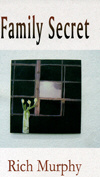Family Secret
Family Secret is an exercise in using whimsical metaphor and sound to illustrate the rather serious business of love's inadequate worldly manifestations. With his quatrains of irreverent, fanciful observations, Murphy draws conclusions about the absurdity of love in the world we've elected to build.
Family Secret is an exercise in using whimsical metaphor and sound to illustrate the rather serious business of love's inadequate worldly manifestations. With his quatrains of irreverent, fanciful observations, Murphy draws conclusions about the absurdity of love in the world we've elected to build.
However, the problem with the poems of this chapbook is that they indeed read like exercises. Rather than striking on poetic truth, we are more often left with, “Yeah, I can see how a family can be like a corporation.” It's as if the poems are unfinished: single ideas fleshed out, but not yet connected enough to yield more than a single note message that can, at times, seem childish despite some decent poetic flourishes.
Similarly, Murphy's ear seems earnest, if misguided. The occasional rhymes work, but the rhythms often stumble with more awkwardness than Murphy intended, and the alliterative effects neophyte. Consider “Mass Consumption”:
The summer's heat lamp swings hips
along the ocean where pubescence consumes
super-sized boys and seasoned girls
and laps the beaches of adulthood.
But there are a few winners here. They tend to be poems more concerned with developing the conceit than shouting “truth” to the reader. When the forcing pressure is relieved and the reader can wander freely, the sometimes startling images Murphy comes up with work best. For example, the leading poem “The Ark of Oops” seems to find the balance:
Pairs of people have accidents, catch
fevers, and get married. Later, the illness
cures itself, the injury heals, and there
is either divorce or braces-for-two for life.
…Couples
who put themselves in harms way for the thrill
of ambulances of physical pleasure understand
nothing from experience ever. The Bunglers
and Klutzes carry headstones for their hearts.
The poems get better towards the end, where the vignettes manage to stand unapologetically on their own. Consider, “Cassanova's Bossa Nova”:
roam floors that beg for chandeliers.
In search of flat-footed beauty
and a bed…The wallflowers can't say
when the tango with the rag doll began,
but witnesses toasted a conga-line
of would-be brides that transcend
a retirement community in Florida,
each giving up her precious moments
on Earth to fandango’s flimflam.
In “Romeo's Ruse,” Murphy leaves us with a meditation on the effect of all he's touched on: “Juliette's wiser bedtime / stories, antidote to a boy's dreams, / never dispense into a daughter's ear.” And so that's it then; we plod on, unwise, never-wise, as the characters in Murphy's poems.





